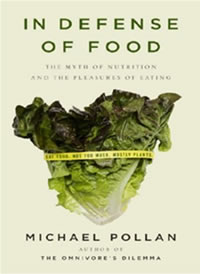Book Notes
 Michael Pollan, In Defense of Food; An Eater's Manifesto (New York: Penguin, 2008), 244pp.
Michael Pollan, In Defense of Food; An Eater's Manifesto (New York: Penguin, 2008), 244pp.
In his bestseller The Omnivore's Dilemma (2006), Berkeley journalist Michael Pollan focused on "the ecological and ethical dimensions of our eating choices," or as one reviewer put it, balancing the demands of appetite and conscience. His current bestseller turns to personal health and how a few simple guidelines make for eating that is both healthy and happy. If you've ever tried to decipher an ingredients label you know that's no easy task. What, after all, are all those "food like substances?" And why do the French eat so richly, worry so little about it, and enjoy better health, while we Americans have a nutrition obsession and an obesity epidemic? Such is our "orthorexia," or unhealthy obsession with healthy eating that has landed most of us in dietary hell. Pollan explains how we got here, and how to get out.
"My aim in this book," he writes, "is to help us reclaim our health and happiness as eaters." To do this he defends real food, as opposed to all those fake food chemicals on a label that you can't pronounce. Pollan has harsh words for the pseudo-science of the nutrition "experts" that reduces food to its constitutive nutrients, the government which collaborates with it, and the journalists who promote it. They have given us the "western diet" that's killing us, "lots of processed foods and meat, lots of added fat and sugar, lots of everything—except vegetables, fruits, and whole grains." He suggests "five fundamental transformations to our food" that caused us to be "overfed and undernourished."
In the third section of his book Pollan expands on what he means with the oft-repeated mantra of his book, the seven words and three rules: "Eat food. Not too much. Mainly plants." He suggests "eating algorithms" that are less intended to identify specific foods to eat or avoid, and instead some guidelines to tell the difference between the two. Eating meat is fine. Your body needs fat. Having up to two glasses of wine per day is almost certainly healthy. When you go to the supermarket, stick to the periphery of the store where you'll find fresh foods, and avoid the middle aisles with processed food fakes. Don't eat anything you can't pronounce, or that your grandmother wouldn't recognize. Spend a little more on real food, eat a little less, and enjoy it all much more. If you follow Pollan's common sense suggestions and "vote with your fork," I dare say you'll enjoy food as a friend rather than as an enemy to battle.


